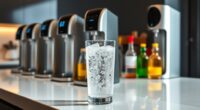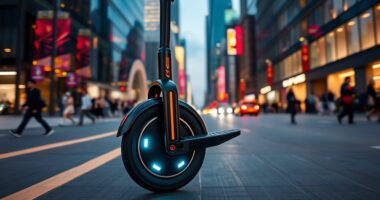If you’re searching for the best water filter pitchers of 2025, I recommend considering options like the Brita UltraMax for large households, the compact Brita 6-Cup for space-saving needs, and the Brita 10-Cup for a balanced choice. For superior filtration, Clearly Filtered No.1 and ZeroWater deliver exceptional purity and taste. Each offers unique features tailored to different lifestyles, so exploring more details can help you pick the perfect fit for your water quality needs.
Key Takeaways
- Consider capacity and size to match household water needs and available refrigerator space.
- Evaluate filtration technology and certifications for effective removal of contaminants like lead, microplastics, and chemicals.
- Choose durable, BPA-free materials with user-friendly features for easy filling, pouring, and maintenance.
- Review filter lifespan and costs to ensure long-term savings and eco-friendly waste reduction.
- Match the pitcher’s capacity and filtration capabilities to household size and specific water quality concerns.
Brita UltraMax Large Water Dispenser with Filter
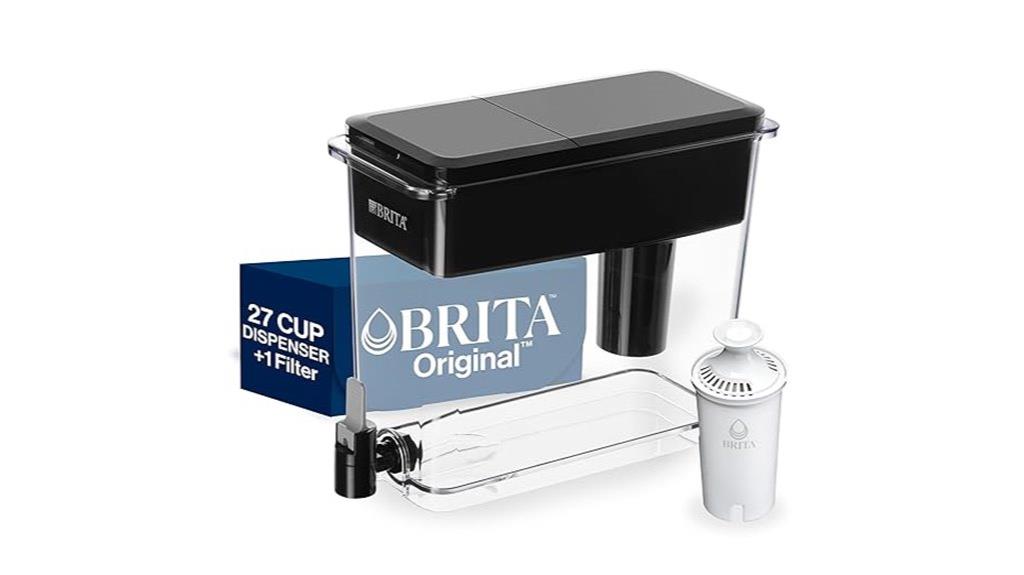
If you’re looking for a water filtration option that can serve a busy household, the Brita UltraMax Large Water Dispenser with Filter is an excellent choice. It holds about 2.1 gallons, making it perfect for families or high water needs. Its BPA-free, space-efficient design fits easily in most refrigerators. The easy-locking lid, precision spigot, and handles make refilling and transport simple. It replaces multiple smaller pitchers, reducing refills and clutter. The included filter lasts around two months, reducing chlorine, lead, mercury, and other impurities. Overall, it offers a convenient, eco-friendly way to enjoy cleaner, better-tasting water every day.
Best For: families or households with high water consumption seeking an efficient, large-capacity water filtration system that fits easily in the refrigerator.
Pros:
- Large 27-cup (about 2.1 gallons) capacity reduces refilling frequency, perfect for busy households.
- BPA-free, space-efficient design fits comfortably in most refrigerators.
- Effective filtration reduces chlorine, lead, mercury, and other impurities, improving water taste and clarity.
Cons:
- Filters may slow down when fully saturated, requiring patience during refilling.
- Some users experience filter clogging or early filter failure over time.
- Initial cost and filter replacements, although affordable, add to ongoing maintenance expenses.
Brita 6-Cup Water Filter Pitcher with 1 Filter

The Brita 6-Cup Water Filter Pitcher with 1 Filter is an ideal choice for individuals seeking a compact, easy-to-use water filtration solution for daily hydration. Its BPA-free design, lightweight build, and ergonomic handle make pouring and refilling simple, fitting comfortably in small fridges. The pitcher reduces chlorine taste, odor, and harmful impurities like lead, copper, and mercury, ensuring cleaner, better-tasting water. The SmartLight indicator helps track filter life, which lasts about two months or 40 gallons. Perfect for home, dorms, or offices, it offers a practical, eco-friendly alternative to bottled water, delivering fresh water with minimal effort.
Best For: individuals seeking a compact, easy-to-maintain water filtration pitcher for daily use in small spaces like homes, dorms, or offices.
Pros:
- BPA-free, lightweight, and ergonomically designed for comfortable pouring and easy handling.
- Effectively reduces chlorine, taste, odor, and harmful contaminants like lead, copper, and mercury.
- SmartLight indicator ensures timely filter replacements, maintaining optimal water quality.
Cons:
- Some users may experience slow flow rate during refilling.
- The standard filter lasts about two months, requiring regular replacement.
- Capacity is limited to 6 cups, which may not suffice for larger households or high water consumption needs.
Brita 10-Cup Water Filter Pitcher with Standard Filter
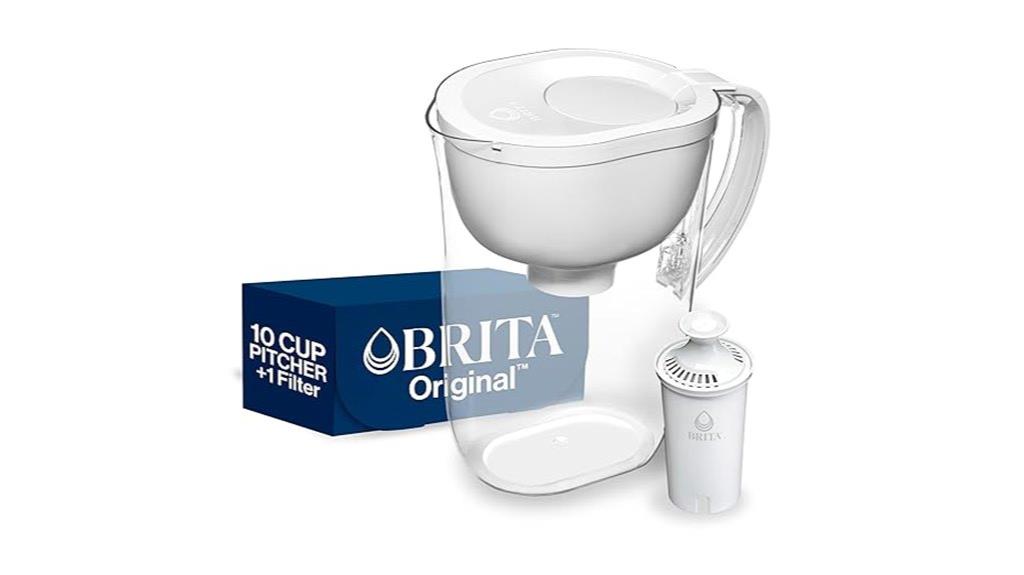
A standout feature of the Brita 10-Cup Water Filter Pitcher with Standard Filter is its generous capacity, making it ideal for households that want to guarantee everyone stays well-hydrated throughout the day. Its sleek, BPA-free design fits comfortably on refrigerator shelves and is easy to refill with a flip-top lid. The pitcher effectively reduces chlorine, odors, and impurities, thanks to advanced filtration technology certified to improve water taste and quality. With a weight of just over 2 pounds when full, it’s convenient to handle and versatile enough for filling bottles or pet dishes. Regular filter changes ensure consistent performance, making this pitcher a reliable choice for better tap water.
Best For: households seeking a spacious, reliable water pitcher that enhances water taste and reduces impurities for healthier hydration.
Pros:
- Large 10-cup capacity fits on refrigerator shelves, ideal for family or shared use
- Advanced filtration technology certified to reduce chlorine, odors, and contaminants
- BPA-free design with easy-fill flip-top lid for convenient refilling
Cons:
- The pitcher can be heavy when filled, requiring careful handling
- Slight slowdown in filtration speed as the filter ages
- Some users have reported flimsy plastic or minor cracks upon arrival
Clearly Filtered No.1 Water Pitcher with Advanced Filtration
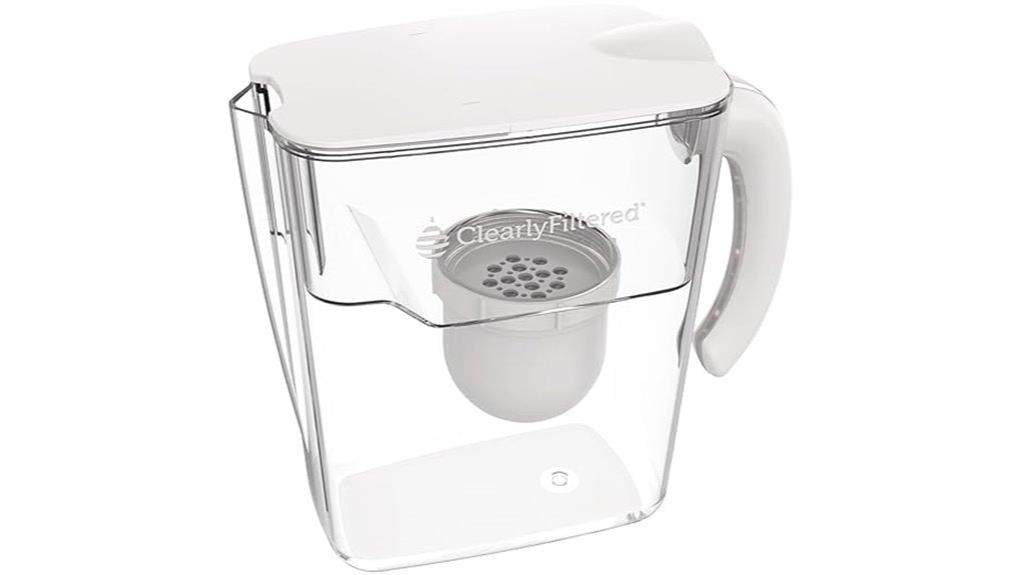
For anyone seeking reliable, high-performance water filtration, the Clearly Filtered No.1 Water Pitcher stands out with its advanced Affinity Filtration Technology. Updated in August 2024, it features an ergonomic handle, easy hinge lid, and a redesigned, stable reservoir made of BPA-free Tritan plastic. It effectively removes over 365 contaminants—fluoride, lead, chlorine, microplastics, pharmaceuticals, and more—while preserving beneficial minerals. With a lifespan of about 100 gallons per filter, it offers consistent performance and easy maintenance. Perfect for home or on-the-go use, this pitcher delivers clean, great-tasting water and helps reduce plastic waste.
Best For: individuals seeking reliable, high-performance water filtration for home, office, or outdoor use who want to reduce plastic waste and enjoy great-tasting, contaminant-free water.
Pros:
- Effectively removes over 365 contaminants, including fluoride, lead, and microplastics, while preserving beneficial minerals
- Durable and eco-friendly construction made of BPA-free Tritan plastic with a redesigned, stable reservoir
- Easy to use and maintain, with straightforward filter replacement and consistent high performance over approximately 100 gallons
Cons:
- Larger size may be less convenient for small storage spaces or travel
- Slightly longer delivery times outside the U.S. for refills and replacements
- Some users initially experienced minor issues like loose filters or lid leaks, though these have been addressed with recent design updates
ZeroWater 12-Cup Water Filter Pitcher
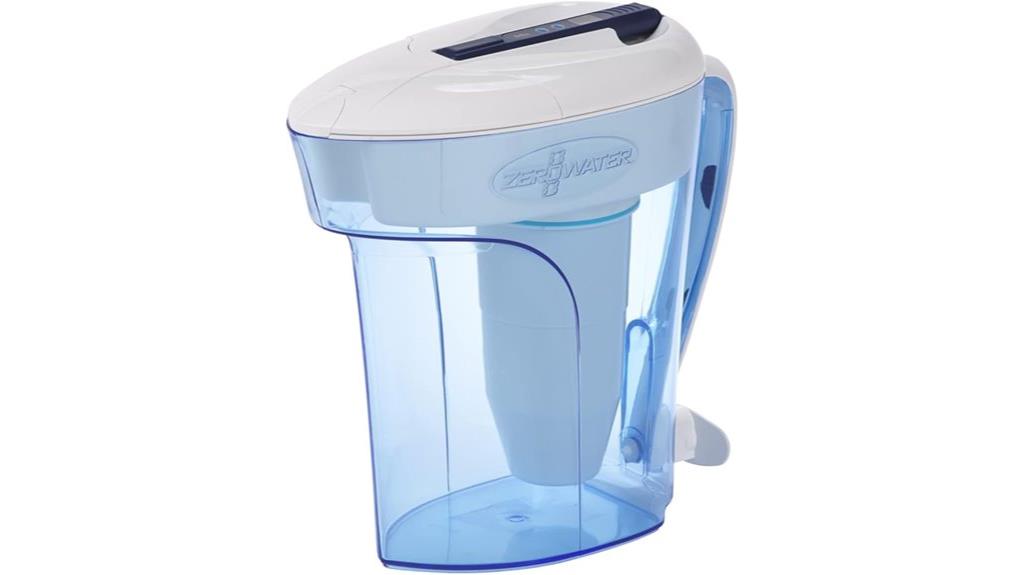
If you’re seeking a reliable water filter pitcher that combines advanced filtration with eco-friendly features, the ZeroWater 12-Cup model is an excellent choice. It uses a 5-stage ion exchange system to remove nearly all dissolved solids, including lead, mercury, and salts, ensuring pure, great-tasting water. The included TDS meter helps you monitor water quality and know when to change the filter. Made from BPA-free plastic, it’s safe and healthy. Plus, by using this pitcher, you can save up to 110 plastic bottles per filter, making it an eco-conscious option for everyday hydration.
Best For: individuals seeking a reliable, eco-friendly water filter pitcher that effectively removes contaminants for safe, great-tasting hydration.
Pros:
- Uses advanced 5-stage ion exchange filtration to remove nearly all dissolved solids, including heavy metals and salts
- Includes a TDS meter for real-time monitoring of water quality and filter life
- BPA-free plastic construction ensures safe and healthy drinking water
Cons:
- Requires regular filter replacements to maintain optimal performance
- The 12-cup capacity may be insufficient for larger households or high water demand
- Can be slower to filter water compared to some multi-stage systems
Factors to Consider When Choosing Water Filter Pitchers
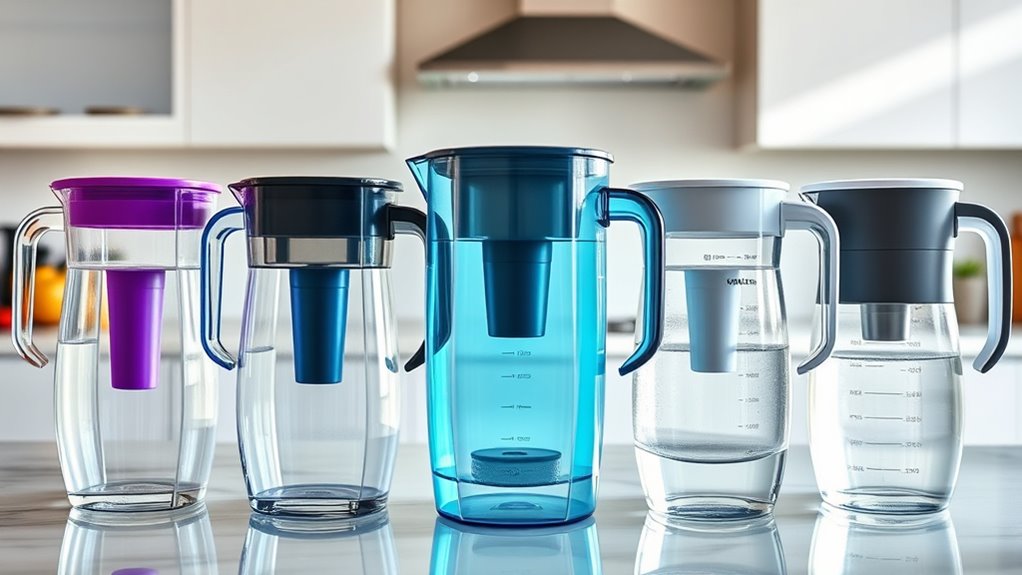
When choosing a water filter pitcher, I consider several factors to find the best fit. I look at how well it filters contaminants, its size for my needs, and how often I’ll need to replace the filters. Environmental impact and cost are also key points that influence my decision.
Filtration Effectiveness
Ever wonder how well a water filter pitcher can actually remove contaminants? The key is looking at its ability to target specific impurities like lead, chlorine, pesticides, pharmaceuticals, and microplastics. Many reputable brands have third-party NSF/ANSI certifications that verify their effectiveness. Multi-stage filtration systems tend to remove a wider range of contaminants—covering heavy metals, VOCs, and microplastics—more thoroughly than single-stage filters. The type of technology used, whether ion exchange, activated carbon, or proprietary blends, also influences what the pitcher can filter out. Additionally, filter longevity—measured in gallons or months—affects continued effectiveness. Regular filter replacements are essential to keep filtration at its best, ensuring your water stays pure and safe to drink.
Capacity and Size
Choosing the right water filter pitcher depends largely on its capacity and size, which directly impact how much water you can filter and store at once. Pitchers range from about 6 to 12 cups, making them suitable for various needs. Larger models, like 10 or 12 cups, are great for families or households with multiple users, reducing the need for frequent refills. Smaller pitchers, around 6 cups, are more compact, perfect for limited fridge space or individual use. Keep in mind, bigger pitchers can be heavier and more cumbersome to handle, especially when filled. When choosing, consider your daily water intake and available storage space. This guarantees you select a pitcher that’s both practical and convenient for your lifestyle.
Maintenance Frequency
Maintaining your water filter pitcher involves more than just replacing the filter; it also requires regular cleaning to prevent mold and bacteria buildup. Most standard filters need replacing roughly every two months or after filtering about 40 gallons. Longer-lasting filters, like Elite or Longlast, can go up to six months or 120 gallons before replacement. To keep your pitcher in top condition, it’s essential to clean the reservoir and pitcher every few weeks, preventing mold and bacteria growth. Many pitchers feature filter indicator lights or timers that remind you when to change the filter, ensuring consistent water quality. Failing to replace or clean filters regularly can slow filtration and reduce impurity removal, compromising taste and safety. Staying on top of maintenance guarantees fresh, clean water every time.
Environmental Impact
Have you considered how your water filter pitcher impacts the environment? Choosing an eco-friendly model can profoundly reduce plastic waste, saving up to 1,800 bottles annually. Replacing bottled water with filtered water cuts down the environmental harm caused by plastic production and disposal. Many high-capacity pitchers are made from sustainable materials like BPA-free plastics or medical-grade Tritan, supporting eco-conscious choices. Proper filter maintenance and timely replacements ensure your pitcher remains effective, preventing waste from ineffective filters. Additionally, selecting a system that minimizes plastic waste helps lower carbon emissions linked to manufacturing, transportation, and waste management. By opting for an environmentally mindful pitcher, you’re not just investing in clean water but also contributing to a healthier planet. It’s a simple step with impactful benefits.
Cost of Filters
The cost of replacement filters is a key factor to contemplate when selecting a water filter pitcher, as it can considerably influence your long-term expenses. Replacement filters typically range from $10 to $25, depending on the type and capacity. Standard filters last about two months or 40 gallons, meaning you’ll need replacements roughly every two months. Higher-capacity filters, like Elite or Longlast, cost more upfront but last longer, reducing the frequency and overall costs. Some brands offer multi-pack discounts, saving money in the long run. When choosing a pitcher, consider both the initial purchase price and ongoing filter expenses to determine the most economical option. Balancing upfront costs with filter longevity helps ensure you’re making a smart investment in clean, great-tasting water.
Ease of Use
When choosing a water filter pitcher, ease of use can make a significant difference in daily convenience. Look for pitchers with ergonomic handles and easy-to-open lids, which simplify filling and pouring. Clear, intuitive filter indicator lights or timers help guarantee you replace filters on time, preventing guesswork. Choose models with straightforward filter replacement processes that don’t require tools or complex steps, saving you time and frustration. Additionally, a design that’s easy to clean—without hard-to-reach crevices—makes maintenance simpler. Lightweight construction and balanced weight distribution also matter, as they make handling and transporting the pitcher effortless. Prioritizing these features ensures that your water filtration routine remains convenient, encouraging consistent use and better hydration habits.
Design and Durability
Choosing a water filter pitcher with durable, BPA-free materials guarantees it lasts through daily use and remains safe to drink from. I recommend selecting models made from Tritan plastic or high-quality BPA-free polycarbonate because they resist cracks and warping. Look for sturdy construction features like reinforced handles, secure lid mechanisms, and impact-resistant reservoirs to withstand accidental drops. The overall design should include ergonomic elements such as easy-to-open lids and comfortable pouring spouts, which make daily use more convenient. Also, check that the filter housing and seals are well-made to prevent leaks and ensure consistent filtration. Finally, consider the pitcher’s size and shape, making sure it fits comfortably in your fridge without sacrificing durability or ease of access.
Frequently Asked Questions
How Often Should I Replace the Water Filter in My Pitcher?
I usually replace my water filter every 2 to 3 months to keep the water tasting fresh and guarantee proper filtration. It’s also helpful to follow the manufacturer’s guidelines, as some filters may last longer or shorter depending on usage. If you notice a change in taste or a decrease in water flow, it’s probably time for a replacement. Regularly changing your filter keeps your water clean and great-tasting.
Are Water Filter Pitchers Safe for Use With Cold and Hot Water?
This question is super important because I’ve seen folks get confused about filter safety with hot water! Water filter pitchers are designed for cold water only—hot water can damage the filter and release harmful substances. I always stick to cold water in mine; otherwise, I risk ruining the filter or harming myself. For hot water, I use a different appliance—safety first!
Can I Use Tap Water With Any Water Filter Pitcher?
You’re probably wondering if tap water is safe with any water filter pitcher. I’ve found that most pitchers are designed specifically for cold tap water, so I wouldn’t recommend using hot water or any other liquids. Always check the manufacturer’s instructions, but generally, tap water is fine. Just make sure you’re regularly replacing the filters to keep the water tasting fresh and pure.
Do Filter Pitchers Remove All Types of Contaminants?
Think of a water filter pitcher as a brave knight, battling to purify your water. While it’s great at removing many common contaminants like chlorine, lead, and sediments, it doesn’t conquer every villain—such as viruses or certain chemicals. So, I’d say it’s a powerful ally, but not a magic wand. For complete protection, especially against all germs and chemicals, consider additional filtration methods or testing.
How Does the Filter Lifespan Vary Based on Water Quality?
When considering filter lifespan, I’ve found that water quality plays a huge role. If your tap water has more impurities or sediments, the filter works harder, so it wears out faster. Conversely, cleaner water lets the filter last longer. I always pay attention to my water source and change the filter more frequently if I notice a change in taste or flow. It’s all about adapting to your water’s specific needs.
Conclusion
Honestly, after reviewing these top pitchers, you’d think choosing the perfect one would be easy. But surprise! It’s almost like selecting a water filter is as complicated as solving world peace. So go ahead, pick the one that fits your needs—just don’t expect it to turn your tap water into a five-star beverage overnight. Sometimes, the simplest choice is the best, even if it’s just a pitcher filled with water.


